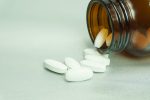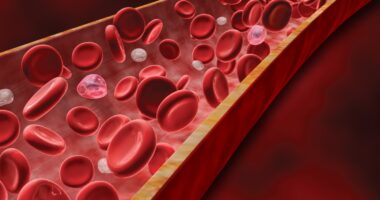Potential PAH Therapy TPN171H Found to Be Safe in Healthy Adults

Lana U/Shutterstock
TPN171H, an experimental oral therapy for pulmonary arterial hypertension (PAH), was generally safe and showed a favorable pharmacological profile in healthy volunteers, according to data from a Phase 1 clinical trial.
The therapy — previously reported to be a more potent and selective PDE5 suppressor than sildenafil in preclinical studies — remained longer in the body than sildenafil and tadalafil, and showed no signs of some worrisome adverse events that have been associated with these other approved therapies.
These positive findings supported the launch of a proof-of-concept Phase 2a clinical trial (NCT04483115), which is testing TPN171H in up to 60 adults with PAH in China.
The Phase 1 findings were shared in the study “A Phase I Study to Evaluate the Safety, Tolerability, and Pharmacokinetics of TPN171H, a Novel Phosphodiesterase Type 5 Inhibitor, in Healthy Subjects,” published in the journal Drug Design, Development and Therapy.
PAH is associated with a narrowing of the blood vessels in the lungs, leading to high blood pressure and an inability to transport oxygen effectively throughout the body due to reduced blood flow.
TPN171H is a new, potent, and selective orally available suppressor of phosphodiesterase type 5 (PDE5), an enzyme found at higher-than-normal levels in the pulmonary arteries of PAH patients. PDE5 breaks down cGMP, a molecule that causes blood vessels to relax and widen (vasodilation), thereby reducing blood pressure.
As such, by blocking PDE5, TPN171H is thought to indirectly increase cGMP levels, support vasodilation, and ultimately reduce pulmonary blood pressure and improve heart function, allowing patients to become more active.
Given that the therapy was reported to be selective and have a longer-lasting effect in animal models than the approved oral PDE5 inhibitor sildenafil, it may have a more favorable safety and pharmacological profile.
Sildenafil, sold under the brand name Revatio, is taken three times a day and has a shorter half-life (3–5 hours) than once-daily tadalafil (17.5 hours half-life), which is marketed under the brand name Adcirca. Both medications have generic versions available on the market.
Half-life is the time needed for a therapy’s initial concentration to drop to half.
The Phase 1 trial evaluated the safety, tolerability, and pharmacokinetics of single and multiple doses of TPN171H in 63 healthy adults. Pharmacokinetics refers to the therapy’s movement into, through, and out of the body.
The study was conducted at the Phase I Clinical Research Center of Shanghai Xuhui Central Hospital, in China.
Participants were assigned to single or multiple doses of oral tablets of TPN171H, at doses between 5 and 30 mg, or a placebo. Multiple dosing was given on day 1, and every day between days 3 and 9 for a total of seven doses.
Individuals were closely monitored for 48 hours after the last dose and were interviewed by telephone by the researchers between one to two weeks after the first dose.
Results showed that TPN171H exhibited a linear, dose-proportional pharmacokinetics profile, and a half-life of 8–10.9 hours — reflecting intermediate values between sildenafil and tadalafil, and suggesting that TPN171H “could be administered once daily for treatment of PAH,” the researchers wrote.
Analysis showed that when taken after a standard meal or a high-fat, high-calorie meal, TPN171H took longer to reach maximum concentration, but resulted in a similar exposure and safety profile to those seen when taken in a fasted state.
The multiple-dosing study, involving the administration of TPN171H tablets within 30 minutes after a standard meal, showed a slight accumulation of the therapy in the body upon repeated dosing.
TPN171H was generally safe and well-tolerated, with the most common treatment-related adverse events being spontaneous erections in males, dizziness, headache, head discomfort, nasal obstruction, pounding or racing heartbeat, flushing, and nausea — consistent with those reported for PDE5 suppressors. No participant withdrew from the study due to adverse events.
In contrast to sildenafil, TPN171H was found to have no impact on general blood pressure and color discrimination, highlighting its high selectivity towards PDE5 among the PDE enzyme family.
Based on these findings, “we recommend a once-daily, post-meal administration of TPN171H in subsequent clinical studies,” the researchers wrote, adding that an even lower starting dose, of 2.5 mg, should be tested in PAH patients.
The ongoing, multicenter Phase 2a trial is evaluating the safety, pharmacokinetics, and effectiveness of TPN171H against both tadalafil and a placebo in adults, 18–75 years old, with PAH.
Participants are randomly assigned to receive a single tablet of TPN171H (at a dose of 2.5, 5, or 10 mg) plus a placebo tablet, tadalafil (20 or 40 mg) alone, or two placebo tablets.
The trial’s main goal is to assess changes in the resistance against blood flow in the pulmonary artery within 24 hours after dosing, while secondary goals include other measures of blood flow dynamics.
Conducted by the Chinese Academy of Sciences’ Shanghai Institute of Materia Medica, and sponsored by Vigonvita Life Sciences, the trial is expected to finish in October.










